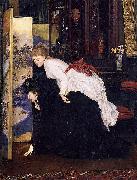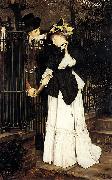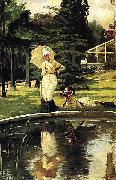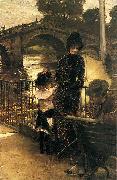James Joseph Jacques Tissot Olja Måleriet ReproduceringAll James Joseph Jacques Tissot Oil PaintingsJames Jacques Joseph Tissot (15 October 1836 - 8 August 1902) was a French painter, who spent much of his career in Britain. Tissot was born in Nantes, France. In about 1856, he began study at the École des Beaux-Arts in Paris under Hippolyte Flandrin and Lamothe, and became friendly with Edgar Degas and James Abbott McNeill Whistler. Tissot exhibited in the Paris Salon for the first time in 1859, two portraits of women and three scenes in medieval dress from Faust. The latter show the influence of the Belgian painter Henri Leys (Jan August Hendrik Leys), whom he had met in Antwerp in 1859. In the mid-1860s, however, Tissot began to concentrate on depicting women, often although not always shown in modern dress. Like contemporaries such as Alfred Stevens and Claude Monet, Tissot also explored japonisme, including Japanese objects and costumes in his pictures. A portrait of Tissot by Degas from these years (Metropolitan Museum of Art, New York) shows him with a Japanese screen hanging on the wall. |
|||

|
|||
|
|
|||
|
||||||||
| James Joseph Jacques Tissot James Jacques Joseph Tissot (15 October 1836 - 8 August 1902) was a French painter, who spent much of his career in Britain. Tissot was born in Nantes, France. In about 1856, he began study at the École des Beaux-Arts in Paris under Hippolyte Flandrin and Lamothe, and became friendly with Edgar Degas and James Abbott McNeill Whistler. Tissot exhibited in the Paris Salon for the first time in 1859, two portraits of women and three scenes in medieval dress from Faust. The latter show the influence of the Belgian painter Henri Leys (Jan August Hendrik Leys), whom he had met in Antwerp in 1859. In the mid-1860s, however, Tissot began to concentrate on depicting women, often although not always shown in modern dress. Like contemporaries such as Alfred Stevens and Claude Monet, Tissot also explored japonisme, including Japanese objects and costumes in his pictures. A portrait of Tissot by Degas from these years (Metropolitan Museum of Art, New York) shows him with a Japanese screen hanging on the wall. |
||||||||
|
|
||||||||
| Måleriet Identifieringen :: 89609 Young Women Looking at Japanese Objects 1869-1870 Medium oil on canvas cyf |
||||||||
|
|
||||||||
| Måleriet Identifieringen :: 89610 The Farewell 1871(1871) Medium oil on canvas cyf |
||||||||
|
|
||||||||
| Måleriet Identifieringen :: 90507 July 1878 Medium oil on canvas cyf |
||||||||
|
|
||||||||
| Måleriet Identifieringen :: 92256 In an English Garden 1878(1878) Medium oil on canvas Dimensions English: 75.88 x 51.44 cm cyf |
||||||||
|
|
||||||||
| Måleriet Identifieringen :: 92762 By the Thames at Richmond Date c.1878-1879 Medium oil on canvas |
||||||||
|
|
||||||||
| FÖREGÅENDE KONSTNÄR Nästa Konstnär | ||||||||
|
|
||||||||
|
James Joseph Jacques Tissot James Jacques Joseph Tissot (15 October 1836 - 8 August 1902) was a French painter, who spent much of his career in Britain. Tissot was born in Nantes, France. In about 1856, he began study at the École des Beaux-Arts in Paris under Hippolyte Flandrin and Lamothe, and became friendly with Edgar Degas and James Abbott McNeill Whistler. Tissot exhibited in the Paris Salon for the first time in 1859, two portraits of women and three scenes in medieval dress from Faust. The latter show the influence of the Belgian painter Henri Leys (Jan August Hendrik Leys), whom he had met in Antwerp in 1859. In the mid-1860s, however, Tissot began to concentrate on depicting women, often although not always shown in modern dress. Like contemporaries such as Alfred Stevens and Claude Monet, Tissot also explored japonisme, including Japanese objects and costumes in his pictures. A portrait of Tissot by Degas from these years (Metropolitan Museum of Art, New York) shows him with a Japanese screen hanging on the wall. |
||||||||
|
|
||||||||
|
KOMMA I KONTAKT MED Oss |










